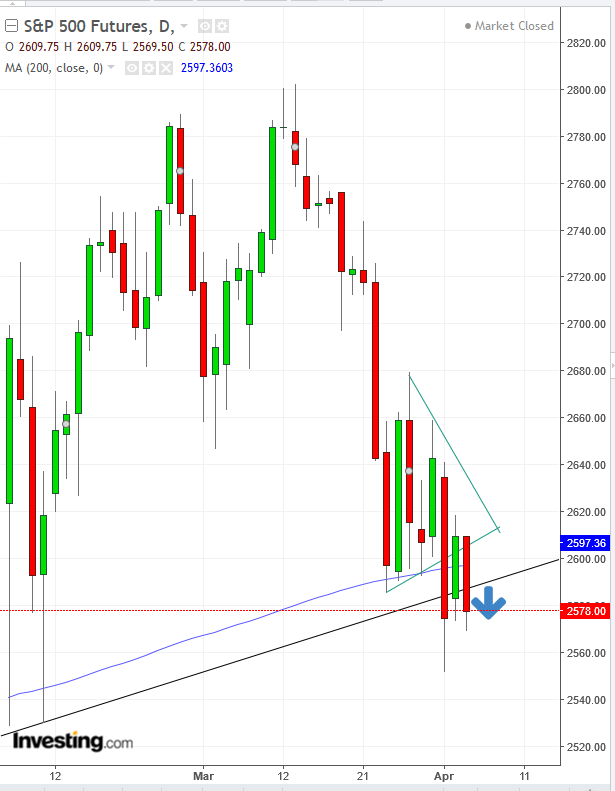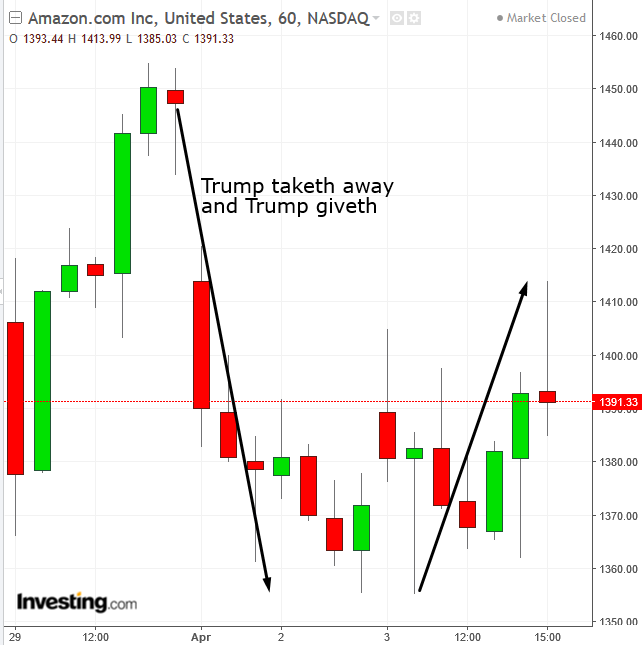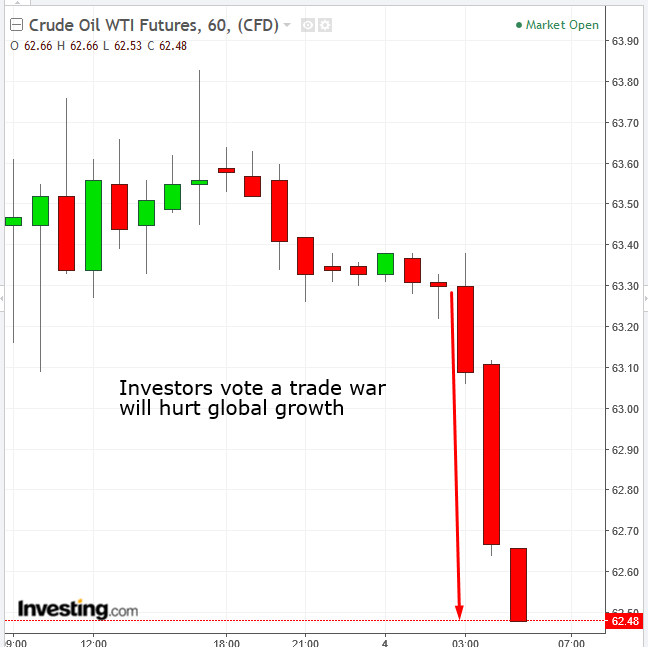- Trade war heats up, as China retaliates for US tariffs on Chinese hi-tech exports
- US futures plunge along with European markets
- Asian markets fell into the close on China announcement
- Oil plunged on the prospects of slower growth resulting from escalating trade war
- The Aussie dropped after earlier gains on trade tiff news about its two biggest trading partners
Key Events
Does yesterday’s spirited US equity rebound, which erased half of Monday’s heart-stopping losses, signal a bottom? Can we expect a return to late January’s record levels, now 10 percent above current positions, or is this the last gasp before this bull sputters out?
Adding to what could be shaping up to be a distressing US session, earlier today China announced a fresh batch of retaliatory trade tariffs on US goods including autos, airplanes, chemicals, tobacco and soybeans.

As a result, S&P 500 futures are plunging. At time of writing they are down a full 2%. NASDAQ 100 futures have dropped to 2.35 percent. In this latest salvo in what looks to be an escalating trade war, China will levy 25% reciprocal tariffs on a total of 106 US products, CCTV reports, citing a decision of the State Council. The plans match the $50 billion in tariffs that the US imposed on Chinese exports.
This comes after China vowed to counter a US proposal to charge additional tariffs on a list of its high-tech exports, warning that the Trump administration is putting the World Trade Organization in “unprecedented danger.” Asian stocks were pushed to close lower after holding ground for most of the trading session. By that time, European stocks were already on a downward trajectory.
Global Financial Affairs
China’s latest shot is a response to the White House's growing list of Chinese products that will face additional duties which was published after Tuesday’s close. The absence of any fresh trade war activity during the US session helped stocks rally. The S&P 500 gained 1.26%, the Dow was up 1.65% and the NASDAQ Composite rose by 1.04%.
This surge followed Monday’s plunge, which had triggered warnings bells of another February-like meltdown. In fact, bulls came back with a fury yesterday, taking the S&P 500 up above its the 200 dma trend line since the February 2016 bottom and the downside breakout of a bearish pennant.
This morning's fresh trade war activity renewed global jitters. Japan’s TOPIX wobbled, gaining just 0.15 percent after bouncing off a 0.2 percent loss but also giving up a higher surge of almost 0.5 percent. Not a show of confidence.
Chinese shares listed on Hong Kong’s Hang Seng underperformed, plunging 1.9 percent. Stocks listed on the mainland’s Shanghai Composite closed 0.15 percent lower, after hitting up to 0.85 percent on intraday gains. South Korea’s KOSPI was also hit hard, slumping 1.4 percent.
Though China is Australia's biggest trading partner, the S&P/ASX 200 edged higher for the first time in four days. Perhaps investors were encouraged by the Shanghai Composite’s resilience to the worries that are weighing on all other markets.
Could investors now shrug off the March losses as a healthy, 8 percent correction? US futures pointing lower should remind us that we could be entering a stronger ramp-up of the trade war narrative.
The White House’s aftermarket release of new tariffs aimed at Chinese products was obviously not priced into yesterdays market action. Was the timing of the release a deliberate move to avoid an all-out market correction, after investor fear of a looming bear market had pushed stocks heavily lower on Monday?
Quiet on the trade war front allowed investors to take a breather. Amazon (NASDAQ:AMZN) transformed a 1.14 percent loss into a 1.48 percent gain.

Still, in the last hour of trade the tech heavyweight gave up gains of more than 3 percent. This extreme volatility underscores a high level of indecisiveness among market players.
In addition to all that's going on, investors are also turning some of their focus to Friday’s Nonfarm Payroll release and its implications for further Fed tightening. After Friday's employment data, bulls hope to be able to focus squarely on markets rather than geopolitical risk as Q1 2018 corporate results are released during the upcoming earnings season.

Oil, which was already drifting, even after an industry report showed that US stockpiles unexpectedly shrank, plunged further, dropping an additional 1.86 percent at time of writing, after the Chinese tariff response.
The Australian dollar gave up a 0.47 gain driven by stronger-than-expected retail sales data, and is posting a 0.1 percent decline, as its two biggest trading partners escalate a trade war that could severely impede its growth.
Up Ahead
-
US employment data due Friday; the jobless rate probably fell in March after holding at 4.1 percent for five straight months.
-
The Reserve Bank of India interest rate decision comes on Thursday.
-
Eurozone inflation data due Wednesday, with the headline rate forecast at 1.4 percent in March, up from 1.2 percent the previous month.
Market Moves
-
The STOXX Europe 600 dipped 0.72 percent, extending the mild 0.1 percent loss hit before the China news. This was already its lowest level in more than a week.
-
Futures on the S&P 500 Index fell 1.47 percent.
-
The MSCI All-Country World Index declined 0.1 percent.
-
The UK’s FTSE 100 fell less than 0.05 percent to the lowest level in more than a week.
-
Germany’s DAX dropped 0.2 percent to the lowest level in a week.
-
The MSCI Emerging Markets Index slid 0.9 percent to the lowest level in more than seven weeks on the biggest fall in a week.
-
The MSCI Asia Pacific Index slipped 0.4 percent to the lowest level in more than seven weeks on the largest fall in a week.
Currencies
-
The Dollar Index dipped 010 percent.
-
The euro climbed l0.16percent to $1.2273.
-
The British pound gained 0.1 percent to $1.4065, the strongest in a week.
-
The Japanese yen advanced 0.27percent to 106.15 per dollar.
Bonds
-
The yield on 10-year Treasuries decreased less than one basis point to 2.76 percent.
-
Germany’s 10-year yield increased less than one basis point to 0.50 percent, the highest in more than a week.
-
Britain’s 10-year yield declined less than one basis point to 1.359 percent.
Commodities
